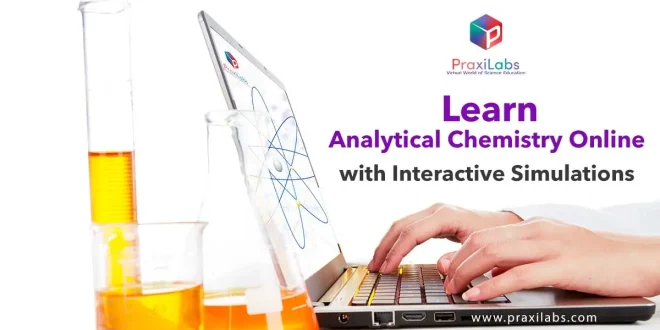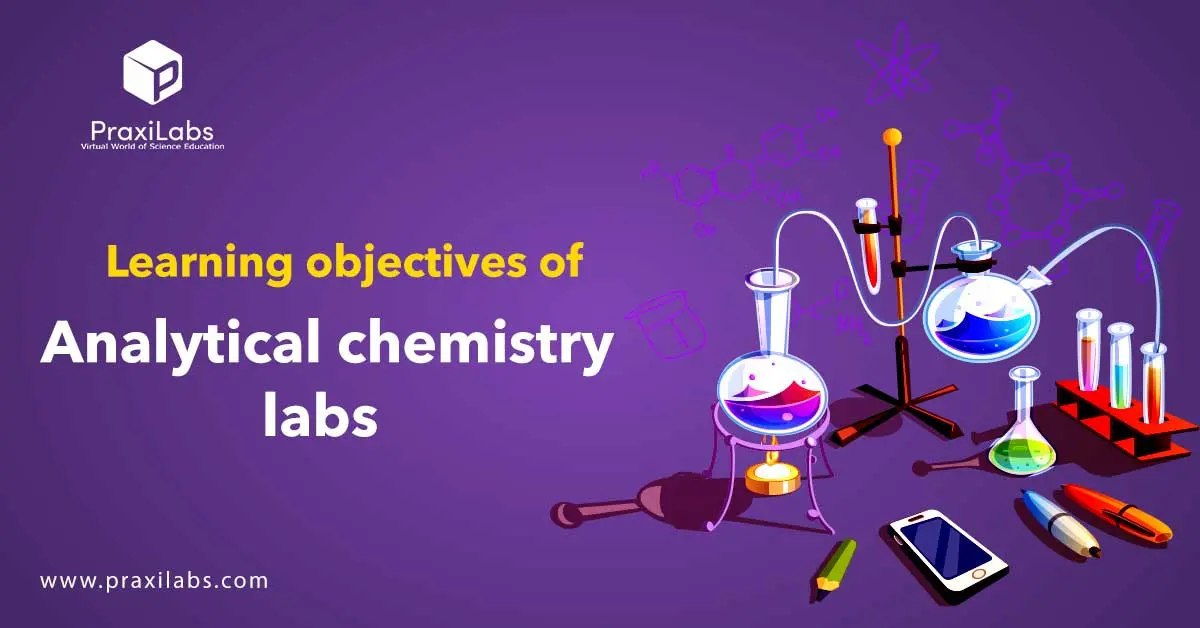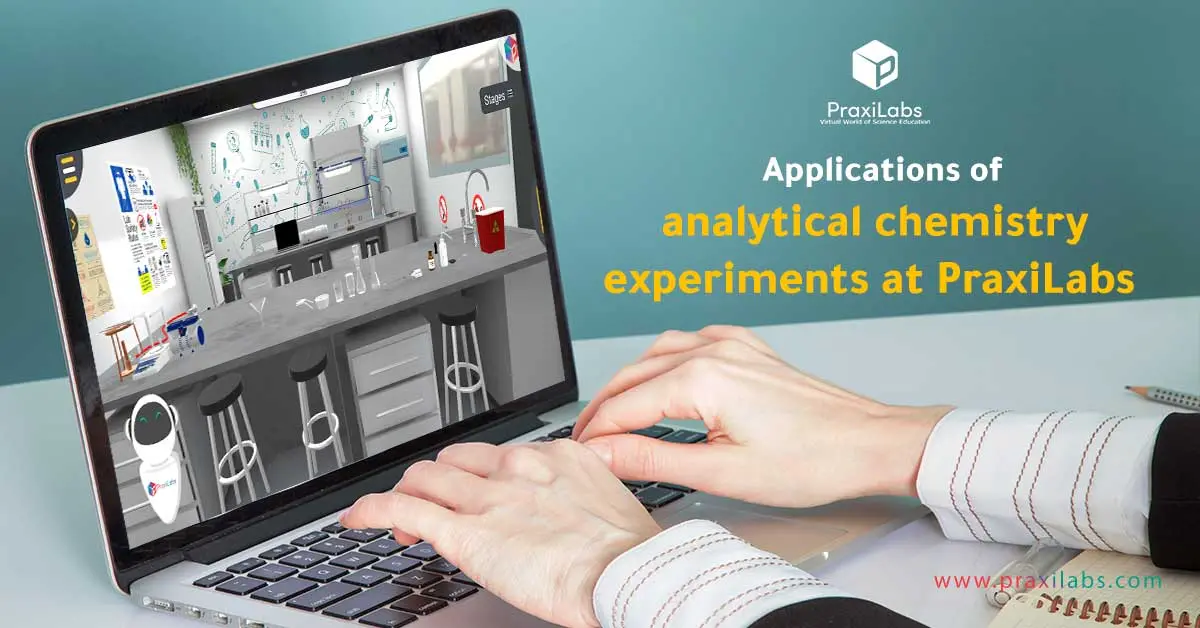Last Updated on July 31, 2025 by Muhamed Elmesery
Chemistry education gets a boost with the integration of virtual analytical chemistry online labs. These online labs offer a variety of benefits for students. Students can perform their experiments in virtual laboratories in a way similar to traditional real laboratories, which helps them gain a deeper understanding.
In this blog post, we will discover analytical chemistry online labs, their benefits, applications of analytical chemistry experiments at PraxiLabs, and more!
Table of Contents
What is analytical chemistry online labs?
Analytical chemistry online labs are 3D virtual lab simulations of chemistry experiments that help students to learn and perform online analytical chemistry experiments in a virtual environment mimicking the real laboratory.
These online labs provide a safe and flexible method to learn about chemical analysis techniques and principles without the need for physical chemicals or specialized equipment.
These online labs cover a wide range of topics, especially in educational platforms like PraxiLabs:
- Types of titrations, and their techniques (ex: Volhard’s method).
- Spectroscopy.
- Chromatography.
- Electrochemistry.
Learning objectives of analytical chemistry labs
Analytical chemistry distance learning aims to equip students with the practical skills and knowledge necessary to perform accurate and reliable chemical analyses. Key objectives include:
- Understanding the principles and mechanisms of various analytical techniques.
- Learning how to interpret and evaluate data.
- Understanding the importance of laboratory safety and proper waste management.
- Learning how to make scientific observations.
- Applying statistical analysis to draw logical conclusions based on observed data.
- Performing analytical techniques that are commonly used in analytical chemistry laboratory.
Core topics covered in analytical chemistry online labs
The following table shows the core topics typically covered in analytical chemistry online labs:
| Topic | Description |
| Gravimetric Analysis | Determination of an analyte based on mass measurement of a solid. |
| Volumetric Analysis (Titration) | Includes acid-base, redox, complexometric, and precipitation titrations. |
| Spectrophotometry (UV-Vis) | Measuring absorbance to determine concentration using Beer-Lambert Law. |
| Flame Emission Spectroscopy | Identifying metal ions based on characteristic flame color emissions. |
| Atomic Absorption Spectroscopy (AAS) | Quantitative analysis of metal ions in a solution. |
| Chromatography (e.g., TLC, GC) | Separation and identification of components in a mixture. |
| pH and Buffer Analysis | Measuring pH, preparing buffer solutions, and understanding their behavior. |
| Conductometric Analysis | Measuring solution conductivity to track reactions or ion concentration. |
| Electrochemical Methods | Includes potentiometry (e.g., using ion-selective electrodes) and voltammetry. |
| Qualitative Inorganic Analysis | Systematic identification of cations and anions in a mixture. |
Benefits of learning analytical chemistry online
The primary benefits of learning analytical chemistry online are:
- Providing students with access to realistic analytical chemistry online labs.
- Allowing students to perform their chemistry experiments in a safe environment without any risks such as dealing with toxic or radioactive substances, they can also perform experiments anytime and anywhere.
- Enriching the students’ knowledge and understanding through a variety of informational and educational content to enhance their learning outcomes.
- Providing equal opportunities for enhanced STEM education for students everywhere.
- An analytical chemistry online lab can be more cost-effective compared to real labs by eliminating the need for physical materials.
Applications of analytical chemistry experiments at PraxiLabs
Aspirin titration (weak acid / strong base titration)
In the Aspirin titration experiment, students will analyze aspirin (acetylsalicylic acid) tablets, “analgesic tablets”. Acetylsalicylic acid content will be assessed using a volumetric analysis technique called titration.
Teach your students how to:
- Become proficient at carrying out titrations.
- Learn the basics of analytical procedures.
- Understand the mechanism of acid-base back titrations.
- Learn the function of titrations as analytical methods.
- Get trained on the setup and execution of titration experiments.
GC Mass Analysis
Using gas chromatography simulator, an environmental water sample containing a combination of pesticides will be analyzed using a GC/MS instrument. First, the pesticides will be extracted from the water sample through a solid-phase extraction setup.
Then, the extract will be dried, purified, and re-dissolved in a specific solvent to be compatible with GC/MS instruments. Afterwards, GC will be used to detect the number of pesticides as well as their relative abundance and retention time.
Finally, mass spectrometry will be used to detect the m/z ratios of each component to predict its chemical structure, along with other characterization techniques.
By the end of the experiments, your students will be able to:
- Become proficient at basic concepts of water sample analysis.
- Learn the basics of chromatographic techniques.
- Understand the mechanism of operation of GC/MS systems.
- Learn the functions of GC and MS in water sample analysis
- Get trained on using the instruments and their software.
What are the key advantages of PraxiLabs virtual chemistry lab?
PraxiLabs provides more than 90 chemistry simulations. Let’s explore some of the key advantages of PraxiLabs virtual chemistry lab:
Input for Pipette & Observation Table – Instant support!
Your students can get the support they need instantly, if a student forgets the right amount they need to enter or if data is entered incorrectly, our virtual lab partner Oxi will alert your student to any mistakes.
Skipping Ahead – Personalised lab experience
If they know it, save time and let them skip ahead when they need to, but still feel engaged.
Your students can click “Skip”, and a list of the experiment milestones will allow them to select and focus on the stage they want to understand more, which provides students with a more learner-centered, focused, and personalized learning experience.
-With LMS integration, if a student skips one of the experiment stages, this will appear in the Student Performance and Progress Reports seen by the instructor.
By using PraxiLabs | A study investigates how virtual laboratory simulation platforms can improve learning outcomes and student engagement in experimental science courses
This research (Beyond the Classroom Walls: Utilizing Remote Virtual Labs to Enhance Learning and Achievement in Science) investigates how virtual laboratory simulation platforms can improve learning outcomes in experimental science courses.
The study demonstrates that PraxiLabs provides a distinct learning environment by addressing issues with safety, accessibility, and resources that are present in physical labs.
Using a combination of approaches, the study examines how PraxiLabs affects students’ understanding of difficult topics, their ability to develop practical skills, and their satisfaction.
According to preliminary results, PraxiLabs promotes an enjoyable educational environment and significantly enhances student outcomes. In addition, the utilization of virtual chemical laboratories is essential for helping students develop their chemistry problem-solving skills.
Try PraxiLabs and Experience a Virtual World of Science Education
Pick The Best Virtual Plan for You!
Frequently Asked Questions
Can you take labs online?
Yes! It is possible to take labs online by using virtual lab simulations, all you need is creating an account on one of trusted platforms that provides virtual lab online.
Is analytical chemistry hard?
It depends on individual strengths and preferences but you have to pay your deep attention. Using analytical chemistry online 3D simulations can help you for more understanding.
What do you learn in analytical chemistry lab?
Understanding the principles and mechanisms of various analytical techniques, how to interpret and evaluate data, the importance of laboratory safety and proper waste management, how to make scientific observations, and more!
Can I self study chemistry?
Yes but self study requires support such as online chemistry courses, analytical chemistry tutor and performing the experiments by using virtual laboratories.
 PraxiLabs A virtual world of science
PraxiLabs A virtual world of science








